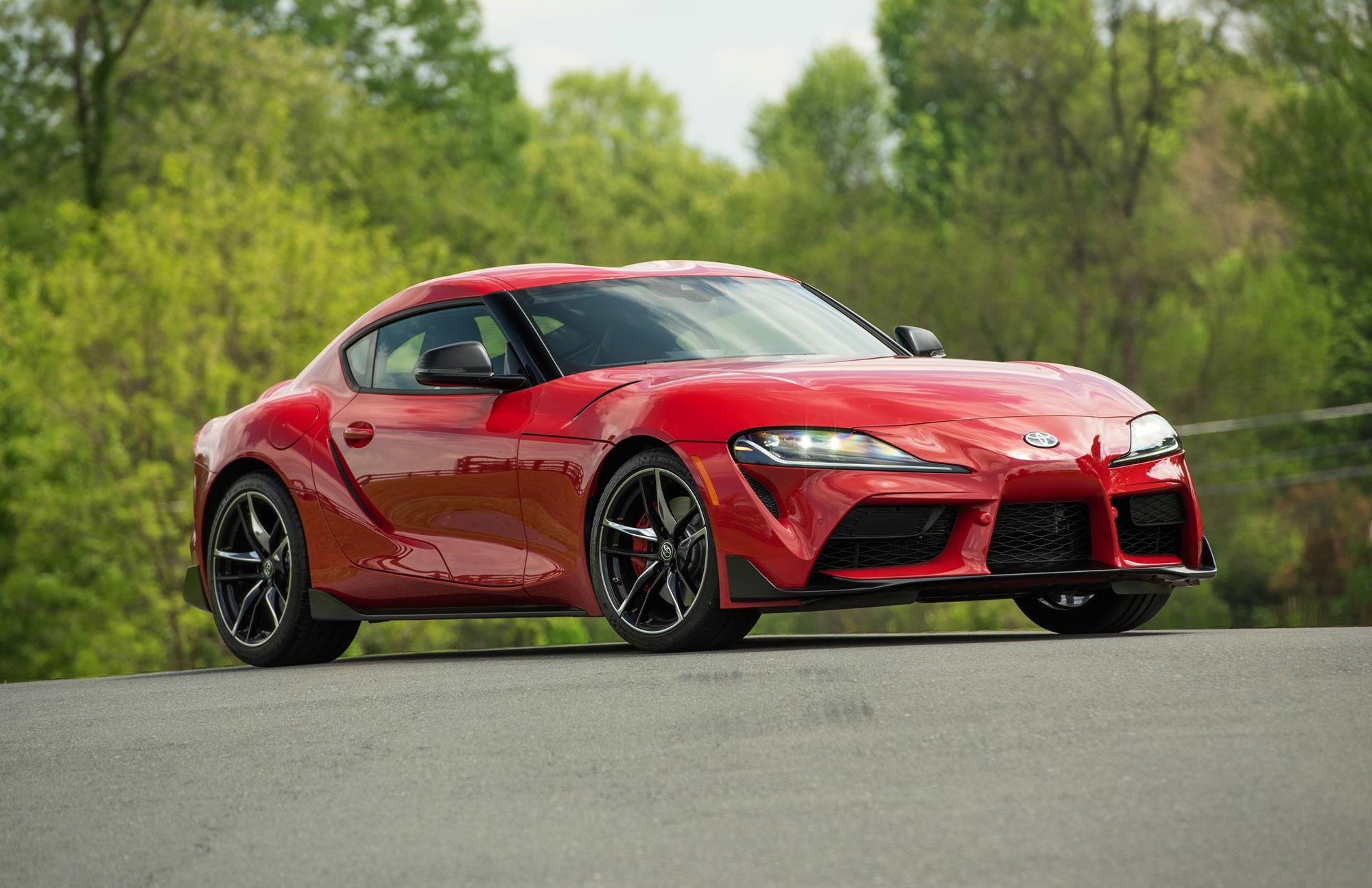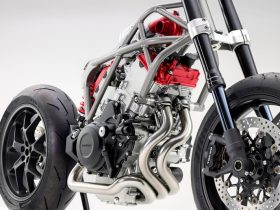In July 2018, in view of tens of thousands of spectators at England’s world-renowned Goodwood Festival of Speed, a low, long-hood sports car wearing full-body camouflage with mysterious “A90” markings blasted up the narrow, curvy hillclimb circuit. For Toyota enthusiasts, “A90” was the giveaway: the A40, A60, A70 and A80 that came before were Supras.
The Toyota Supra was coming back!
In January 2019, the fifth-generation GR Supra, the first global Toyota GAZOO Racing model, made its undisguised world debut at the North American International Auto Show in Detroit, ending years of anticipation and speculation among sports car enthusiasts around the world. Behind the new Supra is a 50+ year lineage of unique Toyota sports and GT cars. Ahead of it awaits the world’s great driving roads, some of which were used to develop this all-new expression of Toyota pure sports car performance.
The 2020 Supra goes on sale this July and will be available in two grades – 3.0 and 3.0 Premium – as well as an exclusive Launch Edition based on the 3.0 Premium grade. Driving enthusiasts can look forward to an exhilarating blend of power, precision and agility thanks to a rear-wheel-drive design that honors Toyota sports car heritage with its low center of gravity and optimal weight balance. There is a strong connection to Toyota’s 1967 2000 GT and 1993-2002 Supra in both design and mechanical configuration. Yet, the 2020 Supra is a fully forward-looking sports car, brimming with a cutting-edge powertrain, chassis and multimedia technology.
By defining specific performance and handling targets early in development, Toyota GAZOO Racing in Japan, with much input from Toyota Motor North America and Toyota Motor Europe, imbued the Supra with its own driving characteristics. While posting the kind of performance numbers that excite enthusiasts, the 2020 Supra will reward drivers of all skill levels with a thrilling sports car feel, even in everyday driving.
Toyota President and Master Driver Akio Toyoda tested the Supra on the Nürburgring and other racing venues to give his personal feedback to ensure this new model would exceed the expectations of Supra fans across the globe.
Supra devotees have waited a long time for the next-generation model, and they will find the 2020 Supra was well worth the wait.
The 2020 GR Supra Performance Story
The 2020 Supra will feature a 3.0-liter turbocharged inline six that will produce 335 hp and 365 lb-ft of torque. The torque comes on strong from very low engine speeds, thanks to a combination of a twin-scroll turbocharger, direct fuel injection and continuously variable timing on both the intake and exhaust camshafts. Engine response is further enhanced thanks to the inline six’s variable intake valve lift system that adjusts intake valve timing and duration.
The 8-speed automatic transmission delivers quick up- and downshifts and features paddle shifters for manual control when desired. Short ratios for the lower gears and a Launch Control function, which is not intended for use on public roads or for repeated short interval use, enable powerful acceleration with maximum traction. Toyota estimates 0-60 mph acceleration in 4.1 seconds, which makes it the quickest Toyota-branded production vehicle to date. Top track speed is electronically limited to 155 mph.
The 2020 Supra offers two driving modes, Normal and Sport. Sport Mode sharpens throttle response, increasing steering weight, improving transmission shift crispness, more aggressive active differential tuning and amplifying exhaust sound.
Traction Mode is part of the Vehicle Stability Control System and when selected provides track-driving capability by reducing intervention of the traction and stability control functions. Launch Control is available when the vehicle is in Sport and Traction mode.
For performance driving enthusiasts, the Supra will have an active differential that uses an electric motor and multiplate clutches to control lateral torque. The active differential precisely controls torque distribution between the rear wheels, with stepless variable locking from 0-100 percent. The differential can control torque distribution between the rear wheels when cornering under both acceleration and braking, enabling greater momentum through a corner.
Shaped by Emotion … and Racing
The 2020 Supra embodies its rich lineage at first glance, with a design that shows a particular kinship with the fourth-generation Supra built from 1993-2002, as well as the landmark 1967 Toyota 2000 GT. The resemblance is more than skin deep: the new-generation Supra also shares with those notable models the common traits of a short wheelbase, sophisticated chassis, and high-performance inline-six-cylinder engine.
Toyota offered a glimpse of the new Supra’s design theme in 2014 with the dramatic FT-1 concept car that emerged from Toyota’s Calty design center in California. Supra’s striking exterior design was inspired by the FT-1’s expressive form.
Optimization of the FT-1 design onto the efficient, high-performance packaging of Supra was achieved by condensing the forms, reducing unnecessary elements and further enhancing the dynamic and powerful character. It focuses on core Supra attributes, such as its inline six-cylinder engine and rear drive layout, while enhancing other features, such as stretching the hood to highlight the engine, creating a taut, but spacious two-seat cabin that helps accentuate an ultra-wide stance. The result is a look unique to Supra internally referred to as “Condensed Extreme.”
Functional by Design
The Supra design delivers a 50:50 weight balance while optimizing front-to-rear aerodynamic balance. Toyota sports car heritage is evident throughout. The double-bubble roof design, for example, recalls the Toyota 2000 GT and it reduces drag by shaving the roof center to reduce the projected frontal area without sacrificing occupant headroom.
The front fascia was inspired by the fourth-generation Supra, yet is even more expressive, with a prominent central grille section flanked by large air intakes. In the rear, the prominent, arching rear integrated spoiler, which helps to suppress aerodynamic lift, pays homage to the tall rear wing that was available on the fourth-gen Supra Turbo. The trapezoidal rear bumper shape conveys a dynamic sense of movement toward the tires.
The six-lens LED headlights integrate both daytime running lamps and turn signal functions to create a distinctive lighting signature for the new Supra. The rear combination lamps feature a purposeful structure with the turn, tail, and stop functions integrated into the distinctive main ring shape. The backup lamps feature white LEDs located in the center of the lower bumper.
The Differences Lie Within
The two grades available on the 2020 Supra – 3.0 and 3.0 Premium – feature the same powertrain, with the differences highlighted on the interior.
The 3.0 grade has a 6.5-inch display with Bluetooth and iPod capability, as well as Alcantara seats. Navigation and JBL Audio will be an available option.
The 3.0 Premium grade features an upgraded 8.8-inch wide-format touchscreen display with Navigation, Supra Connect telematics services, supports wireless Apple CarPlay, a premium 12-speaker JBL audio system, wireless phone charging and a color Head-Up Display. The 3.0 Premium grade will also feature heated, leather-trimmed seats.
The Supra Launch Edition is based on the 3.0 Premium grade.
Both grades are equipped with a deft balance of function and premium comfort and convenience features. Keyless Smart Entry, dual automatic climate control, auto-dimming rearview mirrors, rear camera, rain sensing windshield wipers, garage door opener, power folding mirrors, and a leather-wrapped steering wheel are standard.
Standard safety features on both grades, as well as the Launch Edition, include forward collision warning, automatic emergency braking with pedestrian detection, lane departure warning with steering assist and automatic high beams.
The Driver Assist Package brings additional features that will be optional on both grades. It includes full-speed adaptive cruise control, blind spot monitor, rear cross traffic alert and parking sonar.
Details Matter
Expressive colors accentuate the emotional connection drivers feel with a high-performance sports car, which is why the 2020 Supra’s paint palette will include bold Renaissance Red 2.0, Nitro Yellow and Downshift Blue. The available Phantom Matte Gray adds a sense of drama to the Supra’s tautly curved surfaces by combining a matte finish and a hint of blue.
Other available colors include Absolute Zero White, Tungsten Silver, Turbulence Gray and Nocturnal Black.
Fun fact: In the new version of the famous Supra logotype, the “S” was inspired by the Nürburgring “S” curve.
Ready for Launch
The initial 1,500 production Supras for the U.S. will be Launch Edition models. Each will be uniquely numbered and have distinctive features signifying the exclusivity and excitement of Supra’s return.
The Supra Launch Edition is available in exterior colors of Absolute Zero White, Nocturnal Black or Renaissance Red 2.0, each featuring high-contrast red mirror caps and 19-inch forged matte black alloy wheels.
The Absolute Zero White and Nocturnal Black Supra Launch Editions have a red interior. Each of the racing-inspired seats have red leather trim, with red leather-wrapped steering wheel grips, and a red center console with carbon-fiber accents.
The Renaissance Red 2.0 Supra Launch Edition features a black leather-trimmed interior, with black seats, a black steering wheel and black center console. The black interior also has carbon-fiber accents.
The first 1,500 Supras feature an individually numbered carbon-fiber badge on the passenger-side dashboard complete with a graphic of Toyota Motor Corporation President and Master Driver Akio Toyoda’s signature.
Cockpit Concept: Wrapping the Driver
The 2020 Supra cockpit deftly blends traditional GT elements with ultra-modern functionality. The low, narrow-section dash gives the driver expansive forward visibility, ideal for precisely placing the car in corners.
A high-definition color display forms the instrument panel, projecting a large-diameter, three-dimensional meter dial that seems to float over it. The single-meter design consolidates information necessary for performance driving, such as the tachometer and shift-timing indicator, enabling the driver to easily focus on critical control information through the small-diameter steering wheel.
The display’s easy-to-read layout puts multimedia information, including audio and available navigation, on the right side. An available full-color Head-Up Display projects vital driving and navigation information ahead of the driver.
Toyota designers took a fresh approach to designing the center console, giving it an asymmetrical shape that tightly envelops the driver, with a padded pillar that serves as a right leg bolster. The passenger’s side of the console, meanwhile, is open for a roomy feel, yet also features kneepads for bolstering in corners.
The center console tightly groups controls for sports driving. The climate control panel protrudes from the center dash, easing operation and helping to keep the eyes on the road.
Chassis: Lessons from the Track
Toyota GAZOO Racing had a specific vision when developing Supra. High structural rigidity, a low center of gravity and 50:50 weight distribution were paramount to Toyota’s goal of achieving neutral cornering balance. For example, during testing Toyota identified nine areas of the vehicle’s rear structure to be reinforced to increase rigidity.
Toyota also specified spring and shock absorber tuning for the new double-joint spring strut front suspension and multi-link rear suspension. Likewise, Toyota set specific parameters for the Supra’s stability control system performance.
The front suspension subframe and control arm mounting points are extremely rigid to yield precise cornering characteristics. Aluminum control arms reduce unsprung weight, resulting in superior agility and efficiency. High-performance wheel hubs feature increased stiffness and optimized kinematics. For precise handling, Supra features a variable assist and variable ratio sport-tuned electric power steering.
The multi-link rear suspension with a five-arm construction consists of lightweight aluminum to reduce weight while steel is employed in key areas for added strength and durability. The rigid rear subframe and bracing that connects it to the body structure help ensure extremely precise wheel control. Supra will come standard with 19-inch forged alloy wheels. The rear wheels and tires are wider than on the front (rear tires: 275/35R19; front tires: 255/35R19) to enhance grip, and performance Michelin Pilot Super Sport tires are fitted. Brakes are large at all four corners, highlighted by 13.7-in. front rotors held by 4-piston Brembo calipers.
Standard on all Supras is Adaptive Variable Suspension which instantly adjusts damping force in response to driver input and road conditions. Two settings for the suspension are available – Normal and Sport.
Road and track development took place in France, Austria, Italy (including many winding roads through the Alps), Germany (including the Nürburgring track), Sweden (ice and snow road testing), the U.K., Japan, Australia, and the U.S. A global citizen, the new Supra will be assembled at Magna Steyr in Graz, Austria.
Pricing
| Model # | Grade | MSRP* 20MY |
| 2372 | 3.0 | $49,990 |
| 2374 | 3.0 Premium | $53,990 |
| 2375 | Launch Edition | $55,250 |
*Does not include the delivery, processing, and handling (DPH) fee of $930
| Option | Grade | 3.0 | 3.0 Premium | Launch Edition |
| Model # | 2372 | 2374 | 2375 | |
| Driver Assist Package | $1,195 | $1,195 | $1,195 | |
| Navigation and JBL Audio | $2,460 | – | – | |













